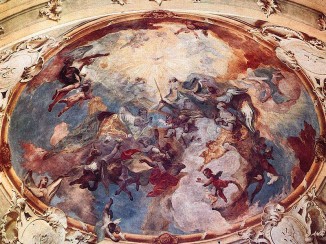 Fr. Thomas Dubay, S.M. begins The Evidential Power of Beauty with this sentence: "Every human person is drawn to beauty."
Fr. Thomas Dubay, S.M. begins The Evidential Power of Beauty with this sentence: "Every human person is drawn to beauty."
We are stirred by all manifestations of beauty: a majestic piece of music, breathtaking scenery, a beautiful face, exquisite artwork. There is beauty in the order of creation as well as in the magnificence of nature.
There is also personal beauty which is reflected best by the saints. In them we see the beauty of "personal splendor" that is arrived at when a person lives the theological and moral virtues to the highest degree. These virtues are "the qualities, traits, and characteristics that make a man or woman true, good, and beautiful as a person."
Finally, there is beauty which is the Creator - divine beauty - which Fr. Dubay describes this way:
"Divine beauty is so vastly superior to the very best of created splendors that we cannot come close to conceiving it. This is true of every divine perfection. God is not only the fullness of joy. He is the very essence of joy, purest ecstasy, delight without limit, supereminently. So also He is purest loveliness, purest wisdom, purest love, all with no end whatever. This is why seeing the Blessed Trinity face to face in the beatific vision casts the blessed into their eternal ecstasy, which is heaven."
In The Beauty of Holiness and the Holiness of Beauty, John Saward writes that "Christ is beauty, and His style, the way He acts in His human nature, is beautiful.... At the beginning of His earthly life as at the end, He preserves integrity, the wholeness which is the hallmark of beauty."
Truth, goodness, beauty, which is God exists, but by God's Providence, He has allowed the ugliness of sin which is Satan. In the parable of the wheat and the weeds, our Lord told us that beauty and evil will co-exist until the final judgment. The one who sows the good seed is the Son of Man; the field is the world, and the good seed are the children of the kingdom. The weeds are the children of the evil one, and the enemy who sowed them is the devil; the harvest is the end of the age, and the reapers are the Angels. (Mt. 13: 37-39)
In his homily, a friend who is a priest explained that our sinfulness, which originates from original sin, is in God's plan for salvation. "The fall of our first parents occasioned the coming of God in human form to suffer and to die for the redemption of a sinful world. The sin of our first parents was the providential foundation for the Incarnation. God became man because man had sinned. Sin then, must have a most important place in the Providence of God."
At times, the ugliness of sin can be overwhelming and beauty seems to be lost, the weeds choking the wheat. Where is beauty in Middle East and other parts of the world where Christians are being persecuted and killed? Where is it in an abortion mill or when someone decides that euthanasia and assisted suicide are preferable to living? How do we find beauty when the ugliness and horror of sin are everywhere?
Bombarded by a constant stream of evil news in recent days, I felt a profound sadness. I craved beauty and the goodness and simplicity of life lived harmoniously and with love. Reaching for Fr. Dubay's book, I reread the sections that would calm my soul and help me to glimpse the beauty that I could not see. At one point, I wondered if I was running away from the harsh reality of life but upon reflection, I realized I was actually going towards the source of life.
In yearning for beauty, what I really desired was God who is Beauty and Truth. I wasn't reading Fr. Dubay's book so much as praying for grace and mercy which Divine Beauty wishes to give us. With God's Providential care, I responded to the sinfulness around me and to my own sins by going to the Father in heartfelt, simple, imperfect prayer and it was the existence of sin that drove me to do it. I realized that there is much beauty in the simple act of turning to God when the darkness overwhelms.
We may not be able to physically help the people of the Middle East but we can pray for all who are persecuted and for their persecutors. We can pray to end abortion and euthanasia and for the conversion of souls, including our own. We can pray because we know that by the providence of God, even our imperfect prayer will lead ourselves and many others to Truth and Beauty who is God.
Copyright 2014 Terry McDermott
Dubay, T. (1999). The Evidential Power of Beauty: Science and Theology Meet. San Francisco: Ignatius Press.
Saward, J. (1997). The Beauty of Holiness and the Holiness of Beauty. San Francisco: Ignatius Press.
About the Author

Guest
We welcome guest contributors who graciously volunteer their writing for our readers. Please support our guest writers by visiting their sites, purchasing their work, and leaving comments to thank them for sharing their gifts here on CatholicMom.com. To inquire about serving as a guest contributor, contact editor@CatholicMom.com.


.png?width=1806&height=731&name=CatholicMom_hcfm_logo1_pos_871c_2728c%20(002).png)
Comments